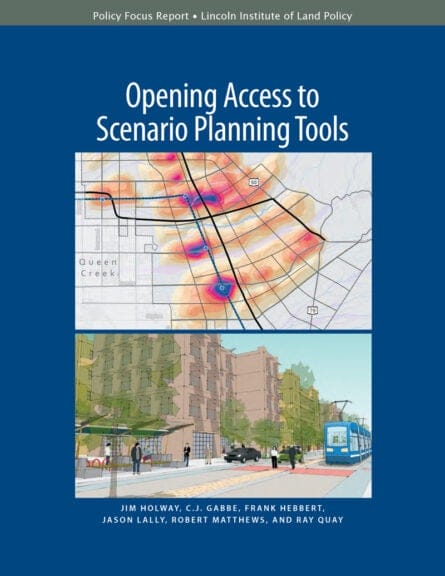Policy Focus Report

Opening Access to Scenario Planning Tools
Jim Holway, C.J. Gabbe, Frank Hebbert, Jason Lally, Robert Matthews, and Ray Quay
April 2012, English
In the face of increasing complexity and uncertainty, planners, public officials, and community residents need new tools to anticipate and shape the future. Opening Access to Scenario Planning Tools examines the current state of scenario planning and scenario planning tools that can help communities and regions prepare for that future through a variety of visioning, land use, transportation, and other planning efforts. A unique opportunity presents itself to use the best and latest technology to help citizens visualize the future of their cities and regions, so that they might chart a course for sustainable growth.
Decisions about the future are often controversial due to competing economic interests, different cultural values, and divergent views about property rights and the role of government. Broader and more effective civic engagement is needed to ensure community support for decisions about development and other land-related policies, and public investments. The traditional predict-and-plan paradigm is inadequate to address all of these challenges. The authors identify a clear need to develop and implement planning tools and processes that foster anticipation and adaptation.
Three concepts will be critical to the scenario planning and tool-building process: collaboration, capacity building, and creation of an open environment for engagement. Collaborative problem solving facilitates resolution of interrelated issues that cannot be resolved by one organization alone. Capacity building is needed to enable individuals and organizations to apply scenario planning methods and tools effectively to their specific planning concerns. An open environment for information sharing and education will help accelerate the use and improvement of scenario planning tools in multiple settings.
The emergence of new and improved scenario planning tools over the last 10 years offers promise that the use of scenario planning can increase and that the goal of providing open access to the full potential of scenario planning tools is within reach. This report recommends seven immediate actions that could be implemented quickly to facilitate this goal.
-
- Create an online platform to foster collaboration in the development and application of scenario planning tools.
-
- Develop a curriculum on scenario planning for the next generation of professional and citizen planners.
-
- Establish a model process for conducting scenario planning and show how it can be used with existing community planning processes.
-
- Illustrate different uses of scenario planning tools in various stages of the planning process to facilitate increased use of scenario planning.
-
- Establish data standards to improve information sharing, starting with development and place types for land use patterns.
-
- Initiate a model collaborative project to demonstrate the potential for integrated tools, models, and modules.
-
- Advance new concepts of anticipatory governance by using foresight and anticipation to address uncertainty and future challenges.
About the Authors
C.J. Gabbe, an urban planner with Fregonese Associates in Portland, Oregon, has had a key role in a number of scenario planning projects using Envision Tomorrow, including Superstition Vistas in Arizona and PLANiTULSA in Tulsa, Oklahoma. Previously he worked for the Portland Development Commission and as a staffer to U.S. Senator Ron Wyden.Frank Hebbert was previously the director of civic works at OpenPlans, a nonprofit organization in New York City using technology to change the way cities and citizens interact.
Frank Hebbert is the director of civic works at OpenPlans in New York City, a nonprofit organizations using technology to change the way cities and citizens interact. He also co-organizes Planning Corps, a network of volunteer planners who provide assistance to nonprofits.
Jim Holway directed Western Lands and Communities, the Lincoln Institute’s former joint venture with the Sonoran Institute, based in Phoenix, Arizona. He was previously assistant director of the Arizona Department of Water Resources and a professor of practice at Arizona State University. He is now the director of the Babbitt Center for Land and Water Policy at the Lincoln Institute of Land Policy.
Jason Lally is the director of the Decision Lab at PlaceMatters, a nonprofit organization based in Denver, Colorado, that works with communities and regions to bring more information to planning and sustainability decision making.
Robert Matthews is project director for the Decision Commons initiative in Seattle, a joint project of the University of Washington’s Runstad Center for Real Estate Studies and the Quality Growth Alliance. His current research is focused on the integration of urban information systems, geospatial analysis, rapid urban modeling, real-time urban visualization, and geodesign.
Ray Quay is a research professional at the Decision Center for a Desert City, a National Science Foundation–funded Decision Making Under Uncertainty Center within the Global Institute of Sustainability at Arizona State University. He was previously the assistant director of planning for the cities of Phoenix, Arizona, and Arlington, Texas.
Keywords
Community Development, Computerized, Conservation, Dispute Resolution, Environment, Environmental Planning, Land Use, Land Use Planning, Planning, Regionalism, Scenario Planning, Sustainable Development, Transportation
